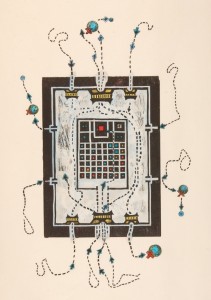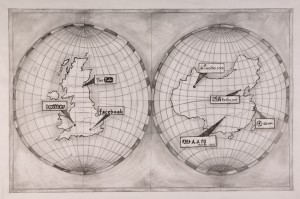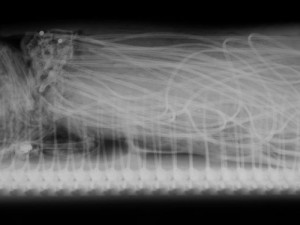“I was driven thence by foul winds for a space of nine days upon the sea, but on the tenth day we reached the land of the Lotus-eaters, who live on a food that comes from a kind of flower. Here we landed to take in fresh water, and our crews got their mid-day meal on the shore near the ships. When they had eaten and drunk I sent two of my company to see what manner of men the people of the place might be, and they had a third man under them. They started at once, and went about among the Lotus-Eaters, who did them no hurt, but gave them to eat of the lotus, which was so delicious that those who ate of it left off caring about home, and did not even want to go back and say what had happened to them, but were for staying and munching lotus with the Lotus-eaters without thinking further of their return; nevertheless, though they wept bitterly I forced them back to the ships and made them fast under the benches. Then I told the rest to go on board at once, lest any of them should taste of the lotus and leave off wanting to get home, so they took their places and smote the grey sea with their oars.”
Odyssey, IX
The sun stops half way through its descent towards the abyss. He wonders where it will go, as he moves his eyes away from the dark horizon. Beyond it, somewhere in the night, his comrades are still rowing through the uncharted sea. By now, if everything had gone according to plan, they should have approached the island… The island… Which island? It was home, long ago, but now he can’t even remember its name. Doulos slips a finger between his belt and the cloth he has around his waist. Carefully, he extracts one soft, fleshy petal. He puts it on his lower lip, and with his tongue he moves it inside his mouth, feeling its smooth surface turning thicker, then slowly dissolving. When he first tried the flowers, the overwhelming sweetness coated his tongue, and it was only out of courtesy for his kind hosts that he had kept on chewing. But now, so many flowers later, now that nothing distinguishes him form his hosts, now… Now… Oh, it’s gone. That thought is gone. No point in chasing it. And his comrades, yes. His comrades at home, wherever it is. But they are not at home, he knows it. Without proof, he knows it for sure.
It was that guy, their master. The man of many ways and no regrets. Like they turned the oars in their hands, he turned their lives in his. And enchanted them, even more than the penetrating juices of the petals of lotus. And now that the sun has started again its descent, in the coming darkness Doulos can see their mouths wide open, as the jaws of the unforgiving sea close on them. The monsters, on the shores, in the caves under water, and in the sky above the waves, they were nothing compared to him. The man who deceived Troy, the trickster who didn’t have to threaten his comrades to obey him, as they did so out of their misplaced love. Him… The king… Doulos squints in the agony of the day, and slowly walks back through the shrubbery. The rising wind swirls the sand around his worn-out sandals. In the distance, behind the olive trees, the lights of the village shine along a wide stretch of land. A few lazy crickets greet his stumbling steps toward his hut. A dog is sleeping in front of his door. Doulos kneels down in front of him and gently caresses his head. The dog growls sleepily, raises his head, licks Doulos’s fingers, sweetened by the lotus.
Behind his hut, beyond the lemon grove, and the stream, and the patches of maritime pines, a pile of enormous rocks cut the wind with their edges. He had hidden there, the day his comrades had come back to look for him. The villagers were still gathered around the fire, methodically chewing on their flowers, looking unimpressed at the foreigners’ frenzy. His comrades had searched the village, running from one hut to the other, shouting his name. The two who had accompanied him in the exploration tried to escape and were dragged back to the ships, in tears. Doulos was hiding behind the rocks, still short of breath. He could see the scene, from that distance, as one looks back at a fading dream just after awakening. He remained in hiding, almost motionless, throughout the night, until, at dawn, the new winds filled the sails and the wooden shells of the Greeks started moving away from the shore. As the ships moved further, Doulos tightened his grip on the rocks. That would have been the last time he would have seen his comrades, heard their voices, the sound of his native tongue… At last, as a final farewell, he heard Ulysses shouting, ‘Doulos, you traitor, you’ll be forgotten!’
Doulos stands up, walks towards the door, opens it. A woman is lying on a rug, chewing her portion of petals. She smiles at him, invites him to lie next to her. Doulos takes off his sandals, dusts off the sand on his feet. He goes to the table and pours two cups of water. He sits at her side, and passes her a cup. She ruffles his hair, gives him a petal. As the juice of the lotus envelops his mouth and teeth, memories get lighter. The dog comes in, and licks the water left in his cup. He looks at him wondering around he room, approaching the door and finally lying in front of it. Doulos reaches for another petal and slips it in his mouth. The woman, next to him, stretches her arm and takes his hand, rubs her fingers on his scars, on the long white marks that made him a soldier, on the hard layers of skin that made him a oarsman, on the painful joints that made him a subject of his master.
Doulos closes his eyes, and the sound of another dog, from another hut, faintly reaches him. There, someone else is reversed on the floor, near another half empty cup of water, far away from any memories. Oblivion. Even remembering oblivion is hard, once the lotus has enveloped you. The land around them, with its sand, the present darkness, the coming light, and darkness again, the distant ships, the wind singing through the rocks, the trees… Like fallen trees they all lie, protected from the sufferings of the world. Like corpses they live, so remote from life they could live forever. And forever forget, about the cares of the sailors, the soldiers, the kings and their ambitions, and their flocks of servants, reversed in the sand, lifeless, at the end of the battles, as the smoke of the sacrifices feeds the gods.
Years before, on the shores of Troy, memories of long-past wrongs possessed bodies much younger than the offenses they had been called to vindicate, and through their veins turned into the terrifying power of armed fists. The smile of the swords, at dawn, as the battlefield presented itself as the last day of the many, the memorable eve of the few. And the unbearable weight of the helmets, as burning as the sun, melting away the remnants of the fallen and the minds of the living. Once the dry plains in front of the burned gates of the city had drank more lives than they could stomach, the spectre of other plains, and other lands, came back to haunt the survivors. Home, as a curse. As a destiny, once again, calling them all to take up the challenge of death. And then, had they passed the swirls hidden between the waves, back again to the chains they used to call their own. The kings, always magnificent, raised they voices over the rowing crews. Home! they ordered. Triumphant commanders, on the deck of their ships, they showed no hesitation in taking the sea again, towards the beds in which their queens laid still, chained to their memory.
Sinking deep towards the boundless realm of the gods, the arrogance of those entitled to glory, the crowned few, pushed the ships away from the shore, back to the native fields and prisons. For Doulos, towards the mountainous pastures of Ithaca, where sheep and shepherds share the same thirst. Swapping the armor for the wooden stick, the sword for the whistle, the obedience in the face of death for that of an entire life. Back, back again. Like a winter that follows an unforgiving summer. Between the sea and the shore, craving a corner to sleep on the crowded deck, on the fields of sheep and tributes, hiding from the wrath of the gods as from that of the king, his face in the sand, his hands, older by the day, gripping on the same myths. Lost in an oblivion in which he only would have remained awake to himself, to his forgettableness.
Until, they took shelter in the land of the lotus eaters, after many days of tempest. The woman starts singing softly, in a language he still does not understand. But is there anyone who understand it? People don’t speak, in the land of oblivion, as they don’t remember their own names, and their debts fade into nothing, as the dogs that move from hut to hut, without fidelity. Is this his woman? He cannot say, and in her dark hair there is no place for the mark of anything but of his fingers, caressing her, rhythmically moving along the riffs of her skull. Is this life at all? He places another petal between his lips and presses in with his teeth. The juice trickles, underneath his tongue, between the molars. Memories get lighter. But he has already thought that. But it doesn’t matter. Thoughts die and are reborn, in a swirl of seasons passing so rapidly, as if the countless days that make the world were comprised in those very moments. And then they die, each and every instant, leaving him motionless, perfectly clear, polished like the bark of an old tree. And behind him, beyond the lemon grove, and the stream, and the patches of maritime pines, a pile of enormous rocks are still cutting the wind with their edges. He has been there, one day, many years ago. He had gone there to look at the sky, and the sea, and had fallen asleep. And he had a dream, and had awakened. And again.
And again.
And again.
Until all the seasons would have run out.


